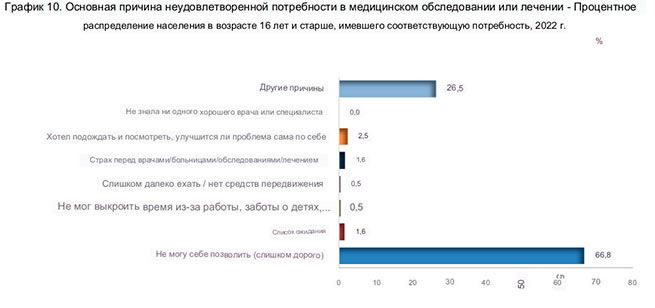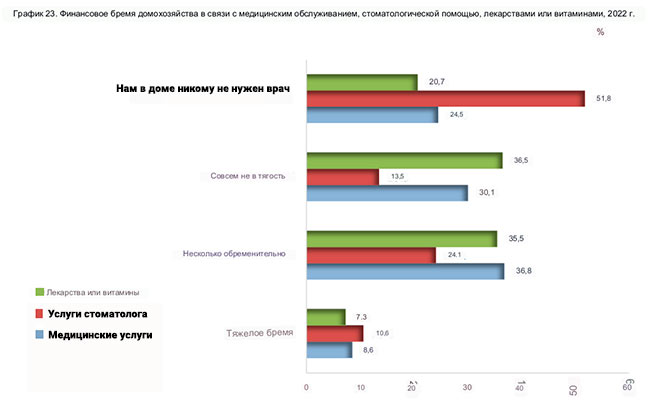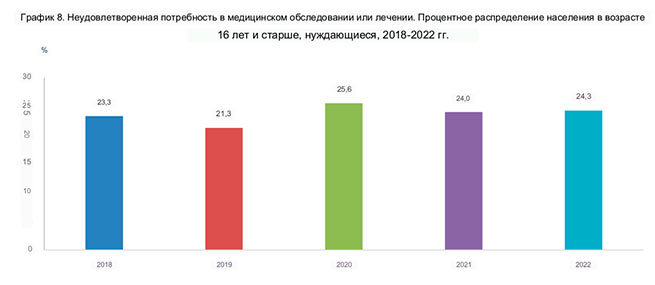Nearly two-thirds of Greeks, i.e. 66.8%, do not visit doctors for medical examinations or treatment because they cannot afford to pay for “free” healthcare services, the Greek Statistical Office said on Wednesday. ELSTAT.
The results of the ELSTAT study on the health of citizens in Greece are “disappointing”, though not surprising, given the tragic dismantling of the public health sector.
Disappointing results come from the National Statistical Office’s annual health survey of Greek citizens in terms of visits to doctors, dentists and chronic diseases. An official study reveals the very serious health problems that citizens of our country face every time they have to use the services of the National Health System (NHS), whether they are insured or not.
According to data recorded by the National Statistical Office (ELSTAT) in the survey “Income and Living Conditions of Households”, 66.8% of citizens over 16 years of age who need medical examination or treatment did not receive it because they did not have the financial means.
About 7 out of 10 (66.8%) people reported economic reasons, ELSTAT notes. This means that the role of public and “free” health care has been virtually abolished, as most citizens find it difficult to either visit a doctor or get tested when they are in need.
ELSTAT survey results
66.8% of Greek citizens do not visit a doctor because they cannot pay for “free” healthcare. It is specified that during the study period, 54% of citizens needed a medical examination or treatment.
Of these, 66.8%: 24.3% did not receive health services every time they needed them. In addition to 68% of those who could not afford it, 2.5% waited for the health problem they faced to go away on its own, and 1.6% did not go to the doctor because of the long queue.

- 4 out of 5, that is, 77.2% of those who need dental care, do not go to the dentist for financial reasons.
- The percentage of unmet need for dental care last year was the highest in five years.
- 21% of the poor aged 16 and over did not have dental, oral or orthodontic examination or treatment when needed.
- 24.9% of the population with chronic diseases – one in four citizens in Greece claims to have a chronic health problem or health condition.
- Approximately 3 in 10 women (27%) and 1 in 5 men (22.6%) report having a chronic problem or chronic illness. Chronic is a problem or health condition that lasts or is expected to last more than 6 months, with or without medication.
- 9% of the population aged 16 years and over have been restricted for six months or more due to a health problem in some of the normal activities of the population.
88.2% turn to friends for moral and financial help.
- 56.8% of Greek citizens say that they are completely satisfied with their lives, and 88.2% – that they have someone to turn to for moral, material and financial assistance.
- The situation is quite different for 13.2% who state that they are socially isolated, and 37.6% report that they have experienced loneliness for some time.
The research data also showed:
- 1.1% of citizens in our country are underweight, 44.1% are of normal weight, 42.7% are overweight and 12.2% are obese.
- 13.5% have vision problems, 78.8% of them are aged 65 and over.
- 11% of the population aged 16 and over have hearing problems. 86.6% of them are aged 65 and over.
- 15.8% experience mobility difficulties (walking or going up/down stairs without assistance or assistance). 74.4% of them are aged 65 and over.
- 11.6% have difficulty with memory-concentration (cannot remember anything or cannot concentrate on what they are doing). 82.5% of them are aged 65 and over.
- 8% have difficulties with care (cannot care for themselves, for example, wash, dress, etc.). 78.1% of them are aged 65 and over.
- 4.7% have difficulty communicating with other people (do not understand them or him, even if they speak the same language). 70.1% of them are aged 65 and over.
Burden of health care costs
The survey looked at whether health care costs have been a financial burden on households over the past 12 months.
4 out of 5 don’t have the money to pay the dentist
The financial burden is considered separately for:
- provision of medical care (medical examinations, doctor visits, hospitalizations, etc.),
- provision of oral care (dental medical examinations or treatment, visits to dentists/orthodontists/orthopedists)
- purchases of medicines, herbs or vitamins (with or without a doctor’s prescription, with or without prescription, excluding birth control pills and any other hormones used only for contraception).
- 8.6% of the population aged 16 and over bear the financial burden of health care costs.
- 10.6% of the population aged 16 and over bear the financial burden of oral care costs.
- 7.3% of the population aged 16 and over bear the financial burden of spending on medicines or medicines.
The following graph 23 shows the above results.

Coverage
The survey covers all private households in the country, regardless of their size and socio-economic characteristics. The following households are excluded from the survey:
- Institutional households of all types (boarding houses, nursing homes, hospitals, prisons, rehabilitation centers, camps, etc.).
- Households with more than five people are considered institutional households.
- Households with foreigners working in diplomatic missions.
In 2022, the survey was conducted on a final sample of 10,202 households and 22,317 people, of which 19,481 were aged 16 or over. The average household size was calculated as 2.2 members per household.
Health system and elections
Not coincidentally, according to a recent Kappa Research poll, the first thing all social groups are asked to do in the new government is improve healthcare. The poll further refutes the New Democracy (ND) government’s narrative of public and free health care at a time when workers are required to pay part of their wages for public insurance. news247.gr.
PS To the data presented above, the author of the publication would like to add that the presence of the so-called. insurance medicine does not mean free medical care. For everything you need to pay at least 25% of the cost. At the same time, the services of doctors in insurance medicine often leave much to be desired, since, according to the doctors themselves, it is not profitable for them to receive patients under state insurance, which means that the quality of the service provided by doctors is corresponding.
Therefore, everyone who wants to receive normal medical care is forced to pay money to the doctor, often beyond the cash desk, or make an appointment with the same doctor for a private appointment. Then the attitude towards the patient and the quality of service improve dramatically. And in this regard, the question arises: why then do we pay rather big payments from our salary?







More Stories
Greece is at the bottom of the EU in information and communication technologies
Real wages in Greece fell by 30%
ELSTAT: inflation increased by another 3.2% in March